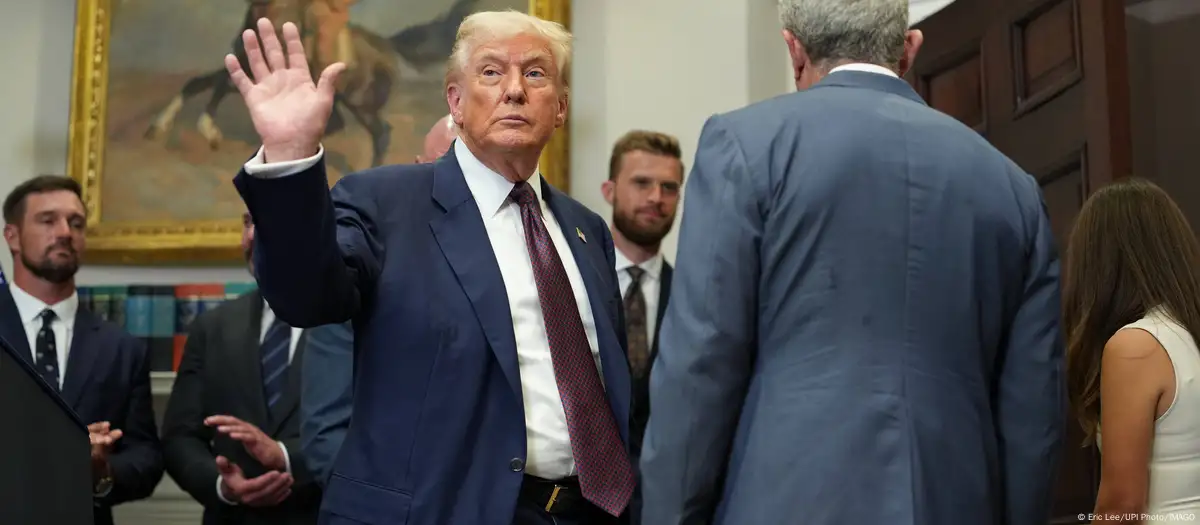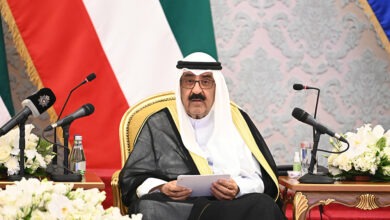
President Donald Trump’s latest wave of tariffs has sent shock waves through the global economy, triggering sharp market declines, straining diplomatic ties, and prompting emergency trade talks across multiple continents.
On Thursday, Trump signed executive order slapping steep ‘reciprocal’ tariffs on imports from more than a dozen countries, including Canada, India, Switzerland, Brazil, and Taiwan. The new levies — some as high as 39% — are set to take effect on August 7, giving nations a narrow window to negotiate exemptions or revised trade terms with Washington.
Wall Street reacted swiftly and negatively — Dow Jones plunged 633 points (-1.44%); S&P 500 lost 107 points (-1.70%); Nasdaq dropped nearly 2.3% and the CBOE Volatility Index, Wall Street’s “fear gauge,” surged to a six-week high, reports international news agencies.
Meanwhile, European and Asian stock markets also sank, with the STOXX 600 hitting a four-week low and Germany’s DAX seeing major losses. Denmark’s Novo Nordisk tumbled nearly 5% after Trump called on pharma companies to cut U.S. drug prices.
The downturn was compounded by weak U.S. economic data. Job growth fell far short of expectations, with just 73,000 jobs added, well below the 115,000 forecasts.
Canada, a close U.S. ally, expressed “deep disappointment” over tariffs that hit its lumber, steel, aluminum, and auto sectors. Prime Minister Mark Carney criticized the justification based on fentanyl trafficking — of which Canada accounts for just 1% of U.S. imports — as “baseless.”
Switzerland, facing a massive 39% tariff, called the move “very bad” for its economy. President Karin Keller-Sutter warned that key sectors like machinery, watches, and metals could be severely affected, even though pharmaceuticals — its largest export — were spared.
In France, wine and spirits producers warned of a “brutal impact,” with the FEVS trade group estimating up to €1 billion in lost sales. Talks continue over potential carve-outs for European alcohol exports, but officials say exemptions are unlikely in the first round of relief.
India, targeted with a 25% tariff, is in emergency negotiations with U.S. officials. Analysts say the tariffs could hit $40 billion in Indian exports and jeopardize defense deals like the proposed purchase of F-35 jets, now likely to be shelved.
South Africa, slapped with 30% tariffs, fears massive job losses in its vital auto industry. President Cyril Ramaphosa vowed to use the extra week before the August 7 deadline to secure a last-minute deal.
Kosovo, in contrast, lifted its own tariffs on U.S. goods in a show of goodwill, while Malaysia successfully negotiated a reduction from 25% to 19%.
The European Union, which had believed that a negotiated 15% tariff cap would take effect August 1, was surprised to see the actual start date postponed to August 7. Despite optimism from EU Trade Commissioner Maros Sefcovic, Trump’s executive order did not address expected reductions — like lowering car tariffs from 27.5% to 15%.
French wine producers, German SMEs, and Italian exporters are still in limbo, as Brussels scrambles for clarification and potential relief.
Simultaneously, Trump lashed out at Federal Reserve Chair Jerome Powell, calling him a “stubborn MORON” and demanding immediate rate cuts. He urged the Fed board to “assume control” if Powell does not act, escalating their long-standing feud. Powell had maintained rates earlier this week, pending further economic data.
With the new tariffs looming, countries from Japan to Sri Lanka are locked in urgent negotiations with Washington. Trump’s administration has made clear it expects trade partners to either strike “fair” deals or face consequences. His defenders argue the tariffs are long overdue corrections, while critics fear global trade instability and consumer price spikes.
As Trump leans into protectionist policies ahead of the 2026 midterms, global leaders must navigate a narrowing diplomatic lane — cooperate or confront.













